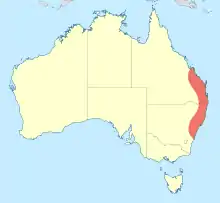Antipodophlebia asthenes
Antipodophlebia asthenes is a species of dragonfly of the family Telephlebiidae,[3] commonly known as the terrestrial evening darner.[4] It is a medium-sized dragonfly with dull colouring.[5] It is endemic to eastern Australia[6] where it has been found flying low to the ground at dusk.[4]
| Terrestrial evening darner | |
|---|---|
| Scientific classification | |
| Domain: | Eukaryota |
| Kingdom: | Animalia |
| Phylum: | Arthropoda |
| Class: | Insecta |
| Order: | Odonata |
| Infraorder: | Anisoptera |
| Family: | Telephlebiidae |
| Genus: | Antipodophlebia |
| Species: | A. asthenes |
| Binomial name | |
| Antipodophlebia asthenes | |
 | |
Antipodophlebia asthenes is the only species of the genus Antipodophlebia.[7]
Gallery
.jpg.webp) Female wings
Female wings.jpg.webp) Male wings
Male wings
See also
References
Wikimedia Commons has media related to Antipodophlebia asthenes.
- Dow, R.A. 2019. Antipodophlebia asthenes. The IUCN Red List of Threatened Species 2019: e.T163529A14255350. Downloaded on 26 July 2019.
- Tillyard, R.J. (1916). "Life-histories and descriptions of Australian Aeschninae, with a description of a new form of Telephlebia by Herbert Campion". Journal of the Linnean Society of London. Zoology. 33: 1–83 [41]. doi:10.1111/j.1096-3642.1916.tb00253.x – via Biodiversity Heritage Library.
- "Species Antipodophlebia asthenes (Tillyard, 1916)". Australian Faunal Directory. Australian Biological Resources Study. 2012. Retrieved 9 March 2017.
- Theischinger, Günther; Hawking, John (2006). The Complete Field Guide to Dragonflies of Australia. Collingwood, Victoria, Australia: CSIRO Publishing. p. 142. ISBN 978-0-64309-073-6.
- Watson, J.A.L.; Theischinger, G.; Abbey, H.M. (1991). The Australian Dragonflies: A Guide to the Identification, Distributions and Habitats of Australian Odonata. Melbourne: CSIRO. p. 278. ISBN 0643051368.
- Theischinger, Gunther; Endersby, Ian (2009). Identification Guide to the Australian Odonata (PDF). Department of Environment, Climate Change and Water NSW. p. 192. ISBN 978-1-74232-475-3.
- Schorr, Martin; Paulson, Dennis. "World Odonata List". Slater Museum of Natural History. University of Puget Sound. Retrieved 9 March 2017.
This article is issued from Wikipedia. The text is licensed under Creative Commons - Attribution - Sharealike. Additional terms may apply for the media files.
